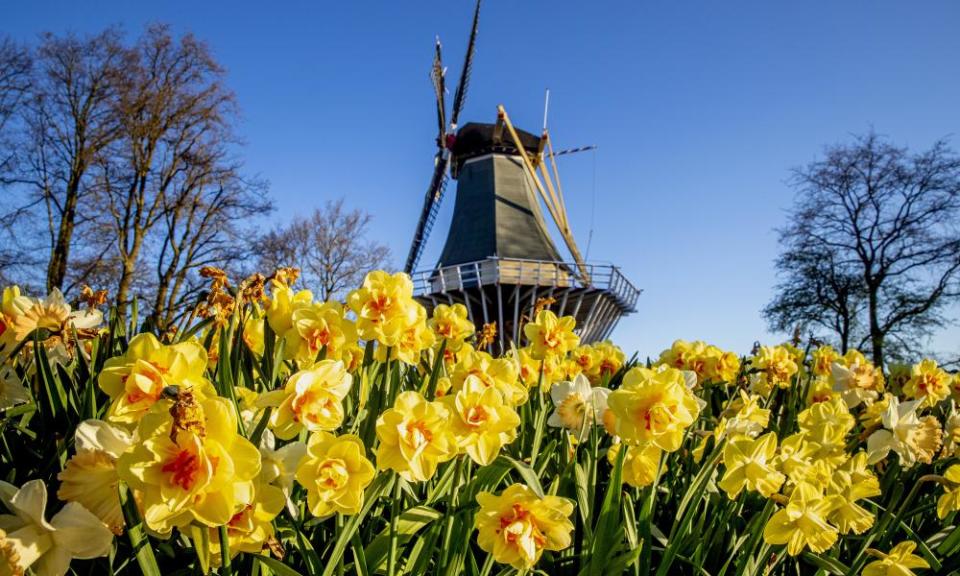Dutch flower park's virtual tour brings its blooms to living rooms

The 7m bulbs were planted and now the flowers are in bloom: tulips, daffodils, hyacinths, orchids, roses, lilies and more. Everything is ready at the Dutch flower park of Keukenhof – everything, except the visitors.
For the first time in its 71-year history, the renowned flower park in South Holland will not open to the public. Instead, managers hope to bring the park to the people via a virtual opening. Every week, three new videos are posted on social media showcasing the profusion of blooms in the English-style landscape park.
“Hyacinths, they prefer to stand in the foreground and the tulip always wants to stand slightly neat, but the daffodil just does not care. No fuss, nice, cheerful,” says gardener André Beijk in one video as he praises his favourite flower.

Another clip showcases the 500 tulip species that grow in the Willem-Alexander pavilion. It is a riot of peach-melba, cerise, orange and pale pink, with lily-flowered and parrot varieties of the best-known Dutch flower. Tulips exist in many colours, except blue or black, says another gardener, Michael van der Voet.
“Corona came to Europe a few weeks ago and we quickly realised that would mean Keukenhof cannot open this year, which is very negative for us,” said Bart Siemerink, the park’s director. “The timing couldn’t have been worse.”
Usually the park welcomes 1.5 million visitors from around the world during its eight-week season between March and May. This year it will not open for a single day.
Siemerink said: “The park is looking astonishing at this moment. It’s the best spring ever. We created a team to try to bring Keukenhof to the people at home instead of people coming from all over the world to visit the tulips in Keukenhof.”
Organisers released a 360-degree video tour of the park on Saturday, with a drone’s-eye view to follow in coming weeks.
The virtual opening is a splash of colour in a torrid year for the Dutch flower industry. Since coronavirus struck Europe, millions of flowers have been destroyed and turned into compost.
Last Monday half the day’s flowers went unsold at Royal Flora Holland, the largest flower auction house in the world. For the remainder, prices have crashed.

“There were so many flowers [unsold]. We couldn’t destroy them quickly enough,” said Michel van Schie, a Royal Flora Holland spokesman. “It was painful to see how the beautiful flowers were destroyed but there is no alternative.”
The auction house does not own the flowers, while growers have pre-existing agreements to destroy unsold stock to preserve prices.
Growers have given away 150,000 bouquets to healthcare workers and people living alone, said van Schie. The industry has also been urging people “to buy flowers not toilet paper” in a campaign slogan that riffs on panic buying in the early phase of the crisis. But growers have missed out on the most important season of the year, which includes Mother’s Day (in the UK), Easter, as well as gardeners’ spring planting.
Van Schie said the sector was hopeful of government support but he worried about the fate of smaller growers among the 4,000 companies who cultivate 30,000 varieties of flowers and plants in the Netherlands. “It is important that not only the large companies but the small growers survive, because otherwise there will be less variety.”
Keukenhof’s manager is confident the park will survive, despite the lack of income from this “disaster” year. He expects the park to open in 2021, but for now flower lovers will have to go online. “You miss a little bit of the atmosphere, you miss the fragrance of the flowers, but you can at least see all the tulips that we have at the moment,” Siemerink said.

 Yahoo News
Yahoo News 
